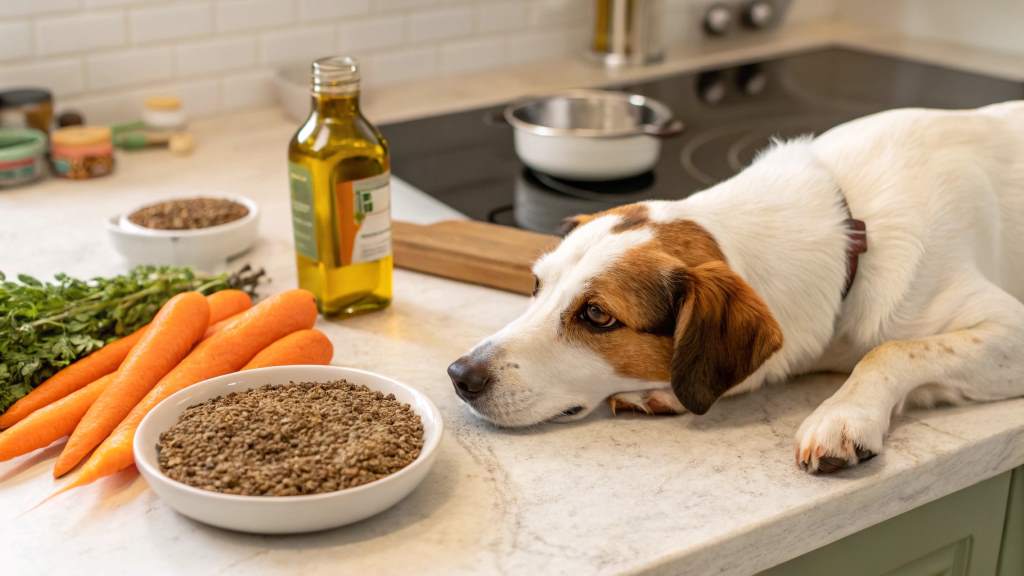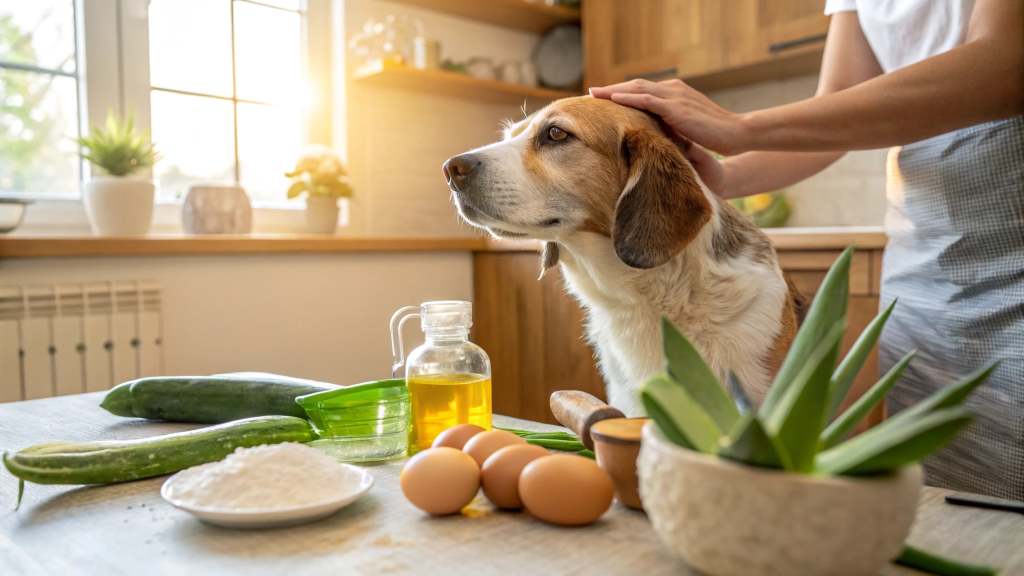
When your beloved dog starts to lose hair, it can be worrying. Whether it’s a patchy coat or noticeable thinning, many pet owners face the challenge of how to grow dog hair back. Luckily, there are several effective and natural home remedies that can help stimulate hair regrowth and restore your dog’s healthy fur. In this article, we will discuss how to grow dog hair back home remedies. By understanding the root causes of hair loss and employing natural treatments, you can not only promote healthy hair growth but also improve your pet’s overall well-being.
Table of Contents
ToggleWhat Causes Hair Loss in Dogs?
Before discussing the remedies, it’s important to understand the potential causes of hair loss in dogs. Hair thinning or bald patches can happen for various reasons:
- Allergies – Dogs, like humans, can develop allergies to food, environmental factors, or flea bites. These allergens often cause itchy skin, leading to hair loss.
- Hormonal Imbalances – Conditions such as hypothyroidism or Cushing’s disease can affect your dog’s hormone levels, which in turn can impact their coat health.
- Parasites – Fleas, ticks, and mites are common culprits. They cause itching and can lead to hair loss if not treated promptly.
- Infections – Bacterial or fungal infections can also cause hair loss. Ringworm is a fungal infection that is particularly notorious for this.
- Poor Diet – A lack of essential nutrients, like omega fatty acids or biotin, can leave your dog’s coat looking dull and thin.
- Stress or Anxiety – Dogs suffering from anxiety or stress may exhibit behaviors like excessive licking or scratching, which can lead to hair loss.
Understanding the underlying cause of your dog’s hair loss is crucial in selecting the right remedy. If the problem is persistent or severe, consulting your vet is always a good idea.
Top 5 Home Remedies to Grow Dog Hair Back
Fortunately, you don’t need to rely solely on expensive treatments or vet visits to restore your dog’s coat. There are several simple home remedies that can stimulate hair growth and improve your dog’s overall coat health.
1. Coconut Oil: A Natural Miracle for Hair Regrowth
Coconut oil is widely known for its numerous health benefits, not just for humans but for dogs as well. Rich in fatty acids and antioxidants, it can penetrate deep into the skin, promoting healthy hair growth. Coconut oil also helps moisturize the skin, preventing dryness and itching—two common causes of hair loss.
To use coconut oil, simply rub a small amount between your hands and massage it into your dog’s coat. You can leave it on for about 10 to 15 minutes before rinsing it off with lukewarm water. Use this remedy 2-3 times a week for the best results.
2. Fish Oil for Shiny, Healthy Fur
Fish oil is packed with omega-3 fatty acids that are essential for maintaining a healthy coat. These fatty acids help reduce inflammation in the skin, promote hair growth, and give the fur a shiny, soft texture. Many dog owners report that supplementing their dog’s diet with fish oil results in a noticeable improvement in their fur.
Add a small amount of fish oil to your dog’s food, starting with one capsule per day for smaller dogs or two for larger breeds. For natural remedies for cats with allergies, you may also want to consider similar supplements, but always consult with your vet to determine the appropriate dosage for your pet.
3. Aloe Vera: A Soothing Solution for Dry Skin
Aloe vera is another powerful natural remedy that works wonders on both skin and hair. It contains enzymes, vitamins, and amino acids that nourish the skin and promote hair regrowth. Aloe vera has anti-inflammatory properties that soothe irritated skin, reduce itching, and encourage healthy hair follicles.
You can apply aloe vera gel directly onto the affected areas of your dog’s skin. Leave it on for 15 to 20 minutes before washing it off. Regular application of aloe vera can help restore your dog’s coat.
4. Apple Cider Vinegar: A Remedy for Dry and Itchy Skin
Apple cider vinegar (ACV) is an excellent solution for soothing itchy skin, which often causes hair loss. Its acidity helps to balance the pH level of your dog’s skin, which can also prevent infections that lead to hair thinning.
To use ACV, dilute it with water (a 50:50 mixture works well) and spray it on the affected areas of your dog’s coat. Allow it to dry naturally. You can also add a small amount of ACV to your dog’s water to help improve skin health from the inside out. However, make sure your dog is not allergic to ACV.
5. Balanced Diet and Supplements for Hair Regrowth
A well-balanced diet is the foundation of healthy hair. Dogs need specific nutrients for optimal coat health, such as vitamins, minerals, and omega-3 fatty acids. Foods rich in biotin, zinc, and healthy fats promote hair growth and prevent hair loss.
Consider switching to high-quality dog food that contains these nutrients. You can also give your dog supplements like biotin or flaxseed oil to support hair regrowth. Always consult your vet before adding any new supplements to your dog’s routine.
Preventing Hair Loss in the Future
While these remedies can help grow your dog’s hair back, prevention is always better than cure. Here are a few tips to prevent hair loss in the future:
- Regular Grooming: Brush your dog’s coat regularly to remove dead hair and dirt. This stimulates the hair follicles and promotes growth.
- Flea Prevention: Make sure your dog is on a flea-prevention regimen. Fleas are one of the main causes of itchy skin and hair loss in dogs.
- Proper Nutrition: Feed your dog a well-rounded diet that includes all the necessary vitamins and minerals. Ensure they get plenty of protein, healthy fats, and fiber.
- Minimize Stress: Keep your dog’s environment calm and free from stress. Regular exercise and mental stimulation can help reduce anxiety-related hair loss.
- Regular Vet Checkups: Regular visits to the vet can help you catch any health issues early on. Hormonal imbalances, infections, or allergies may not always be visible but can lead to hair loss.
FAQs
How long does it take for a dog’s hair to grow back?
It can take several weeks to months for a dog’s hair to grow back, depending on the severity of the hair loss and the remedies used. Be patient and consistent with treatments.
Can I use human hair care products on my dog?
No, human hair care products are not suitable for dogs. They can irritate your pet’s skin and exacerbate hair loss. Stick to pet-safe shampoos and conditioners.
Is coconut oil safe for dogs?
Yes, coconut oil is safe for dogs when used in moderation. It can help improve coat health and treat dry, irritated skin.
What is the best food for growing dog hair back?
Look for dog food with omega-3 fatty acids, biotin, zinc, and high-quality protein. These nutrients support healthy hair and skin.
Can stress cause hair loss in dogs?
Yes, stress is one of the major causes of hair loss in dogs. Dogs that experience anxiety or a stressful environment may exhibit behaviors that lead to hair thinning or bald spots.
Conclusion
Hair loss in dogs is a common concern for many pet owners, but with the right home remedies, it is possible to encourage healthy regrowth. From using natural ingredients like coconut oil and fish oil to maintaining a balanced diet, these remedies can help restore your dog’s shiny, healthy coat. Always consider your dog’s overall health and consult a veterinarian if the issue persists.
By knowing how to grow dog hair back home remedies and taking proactive measures and applying the right treatments, you can ensure that your dog’s fur remains soft, shiny, and full of life. With a little care and consistency, your dog’s hair will grow back in no time, leaving you both happy and healthy.

